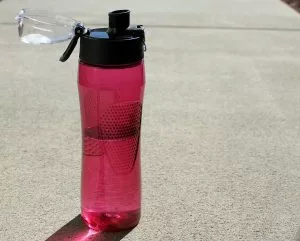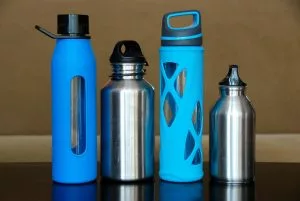
We have all been told about the benefits of drinking water out of a reusable bottle. It’s convenient, better for the environment than single-use bottles, and increases your daily water intake. However, if your reusable water bottle is made out of plastic, it may be more damaging to your health than it is beneficial. In a recent study, chemists at the University of Copenhagen discovered that tap water that gets stored in reusable plastic bottles contains hundreds and sometimes thousands of chemicals; many that are damaging to human health, and many more that have unknown toxicity.
The chemists tested three different types of popular plastic water bottles, two of which were biodegradable. The researchers stored tap water in both used and new bottles for 24 hours. Some of the bottles had been machine washed, some had not, and some had been rinsed 5 times with tap water. They then tested the water in the bottles for a variety of chemicals.
Shockingly, after just 24 hours, the researchers found hundreds of substances present in the tap water stored in the new bottles—including substances that had never been found in plastic. Worse still, they discovered THOUSANDS of substances in the water stored in bottles that had been through a dishwasher cycle. And even the tap water stored in thoroughly rinsed bottles contained a significant percentage of toxic and unknown substances. More than 400 of the substances were derived from plastic and 3500 from dishwashing soap.
Of the substances present, the most notable were endocrine disruptors, carcinogens, plastic softeners, antioxidants, release agents, and DEET, a toxic insect repellant. Many of the other substances found were either unknown substances or substances that have not been studied enough to know their effect on human health. The most toxic substances were found after dishwashing, most likely because washing can degrade plastic and increase the leaching of chemicals.
This study reveals a shocking lack of regulation and knowledge in this area.
Regulation of the production of plastic bottles is extremely lenient and does not require manufacturers to ensure their products are safe to use. And the general public knows virtually nothing about the hundreds of potentially toxic chemicals they may be inadvertently adding to their water from reusable plastic bottles. They may believe they are doing something good for their family and the environment; drinking water instead of other, less healthy beverages and doing so in a sustainable way. Instead, they may be contaminating their family’s drinking water right in their own home.

The public needs to be aware of this danger, and the government needs to take action. We need stricter manufacturing regulations and rigorous testing to ensure that reusable plastic water bottles are safe to use, but that effort will most likely take time and face stiff opposition. Until then it will be up to consumers to protect themselves. So, until plastic water bottles are regulated to be safer for use, switching to a glass or stainless steel water bottle may be the healthiest option for you and your family.

"*" indicates required fields